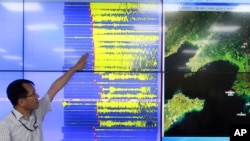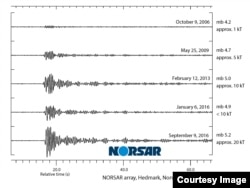North Korea's missile test Friday was its fifth and most powerful to date - causing a 5.3-magnitude earthquake and concern that Kim Jong Un continues to display what one regional leader calls "maniacal recklessness."
The explosion, although troubling and on par with the bombs which destroyed Hiroshima and Nagasaki, is not comparable to the much larger explosive devices that were tested by the Soviet Union and the United States and in the 1950's, according to Joshua Pollack, editor of the Nonproliferation Review.
"This is the largest, but of course it's the largest North Korean test," Pollack told VOA. "It's not in the same class as the things superpowers were testing in the 1950s."
Estimates of the explosion range from 10 kilotons to 20 kilotons. Because the test was conducted deeper in a mountain, the same site used for previous tests, the likelihood of radioactive leakage is smaller, making it more difficult for analysts to pinpoint just how powerful it was and what kind of radioactive material was detonated.
The seismic activity recorded in this test, however, is not significantly more powerful than previous ones. A test conducted in February 2013 triggered an earthquake of 5.0 magnitude, according to NORSAR, a Norwegian non-profit which monitors nuclear explosions and seismic activity worldwide.
A lingering question for many North Korea analysts is whether the country sees its nuclear program and missile tests as leverage in international negotiations. Or if it's planning to actually use the weapons against its perceived enemies. According to Pollack, this test gives no indication that North Korea is looking to launch an offensive.
"This is a country whose leadership is obsessed with national defense - and not just national defense but independent national defense, not relying on allies as they were forced to during the Cold War," Pollack said.
Pollack added that Kim Jong Un wants to prove himself and his country in the arena of world powers and to not be "overshadowed by their national capabilities."
Kim Jong Un has not yet met with any other heads of state in his four years leading North Korea, in large part because of the international community's marginalization of Pyongyang because of its nuclear and missile programs.





